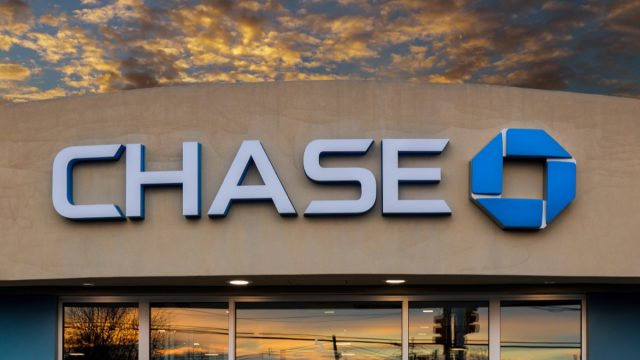Chase Bank Customers, Prepare for “Sweeping Changes,” Head Says

You work hard for your money and rely on your bank to safely store your earnings and allow them to accrue some interest at the same time. And while there are costs related to banking, such as fees for late payments and annual fees for credit cards, we don’t typically expect to have to pay for our checking accounts. However, some banks do charge a monthly maintenance fee for that service. In light of pending regulatory changes, the nation’s largest bank for consumers, JPMorgan Chase, might be following suit.
RELATED: Ex-Bank Employee Says “Never Deposit at an ATM” After Woman Loses $1,000.
In a new report published by The Wall Street Journal, Marianne Lake, CEO of consumer and community banking at Chase, said that bank might have to start charging for services that are currently free, including checking accounts and wealth-management tools.
According to Lake, the adjustments would be necessary due to new regulations coming down from the Consumer Financial Protection Bureau (CFPB). In January, the agency proposed rules to cap overdraft fees at $3 and late fees at $8 and limit debit-card fees. If potential rules become law, Lake argued that customers will have to account for the higher costs.
“The changes will be broad, sweeping and significant,” she told the WSJ. “The people who will be most impacted are the ones who can least afford to be, and access to credit will be harder to get.”
The CFPB passed the rule capping credit card late fees in March, but several banks are appealing it to prevent it from becoming law. The WSJ reports that the appeal is currently pending before a judge.
Chase executives said in an investor presentation that they would increase interest rates and be more cautious about underwriting credit card loans to combat the financial ramifications of a late fee cap on credit cards, the WSJ reported.
RELATED: Chase Slammed for “Unconscionable” Fees on Customers Who “Did Nothing Wrong.”
Lake anticipates other banks will implement similar fees—but not everyone is convinced that the new law would actually be detrimental to the American consumer. A similar conversation arose in 2010 in the wake of the 2008 financial crisis, when some lenders planned to charge fees for debit card purchases and then backtracked after customers threatened to take their business elsewhere.
“The banks say that their only option is to pass on their costs to customers, but that’s not true,” Dennis Kelleher, president of Better Markets, told the WSJ. “Yet again, banks are dressing up their attempts to maximize their own profit under the guise of what’s good or bad for customers.”
According to the WSJ, Better Markets is in favor of the new regulations.
However, banks say that the “scale” of the new regulations makes the current situation more precarious. The WSJ notes that the regulations would also limit how much banks can charge companies including Venmo and CashApp for access to customer data and make it more difficult for banks to lend by holding more reserves.
Big banks might also end up profiting over smaller, regional banks, which aren’t able to offset costs to other areas of their business. But either way, because of steep competition in the banking sphere, larger institutions may need to keep their services free to retain customers, Dan Goerlich, a consulting partner at PricewaterhouseCoopers, told the WSJ. If they don’t, consumers might end up switching to other banks that still offer the free services they’re accustomed to.
- Source: CFPB Proposes Rule to Close Bank Overdraft Loophole that Costs Americans Billions Each Year in Junk Fees
- Source: https://www.consumerfinance.gov/about-us/newsroom/cfpb-bans-excessive-credit-card-late-fees-lowers-typical-fee-from-32-to-8/
- Source: CFPB Proposes Rule to Stop New Junk Fees on Bank Accounts
- Source: CFPB Bans Excessive Credit Card Late Fees, Lowers Typical Fee from $32 to $8